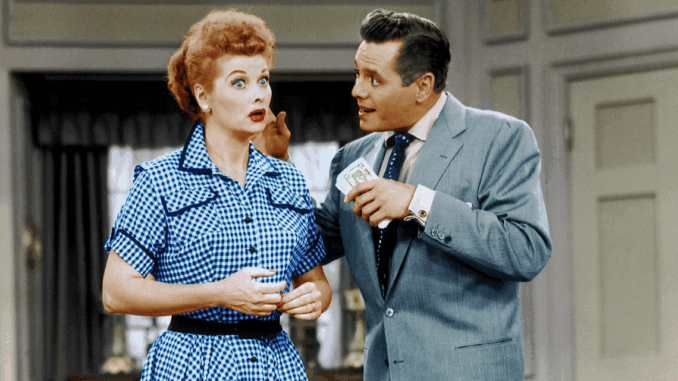
I Love Lucy is often lauded as the quintessential sitcom, a high-energy explosion of marital comedy where the chaos of Lucy Ricardo was always neatly resolved by the love of her Cuban bandleader husband, Ricky. On-screen, Lucille Ball and Desi Arnaz were television’s most beloved couple, selling the illusion of a passionate, if tempestuous, marriage.
Yet, behind the brilliant comedy, the reality of Ball and Arnaz’s relationship was far more complex and ultimately tragic. No one had a more unique vantage point to witness this disparity between the on-screen fiction and the off-screen turmoil than Keith Thibodeaux, the actor who played their on-screen son, Little Ricky.
Thibodeaux, who was cast in 1956 and was the last living regular cast member from the classic show, has often spoken candidly about his experience. He revealed that even as a young child, he could sense a profound ‘instability’ and tension between the couple that was a stark contrast to the perfect family they portrayed. His account offers a poignant perspective on the high cost of Hollywood’s most iconic television romance.
The Audition and the Immediate Family Connection
Keith Thibodeaux—billed as Richard Keith because producer Desi Arnaz thought his French surname, Thibodeaux, was too hard for American audiences to pronounce—was only five years old when he landed the coveted role of Little Ricky. A talented drummer from Louisiana, his audition was legendary: he impressed Arnaz so much that the producer famously exclaimed, “I think we found Little Ricky!”
Thibodeaux wasn’t just an actor; he became like a member of the Arnaz family. Lucille Ball and Desi Arnaz Jr., their real children, were close in age to Keith, and he was a frequent guest at the Arnaz family home, traveling with them during the summers and becoming best friends with Desi Jr., whom he taught to play the drums.
This closeness gave Thibodeaux a unique, intimate look into their lives that few others in the Hollywood orbit ever saw.
Sensing the Subtext: Tension Behind the Scenes
While on the Desilu set, the atmosphere was highly professional and focused on the intricate demands of the live audience filming format. However, it was during his time spent with the Arnazes outside the studio that the instability became apparent.
Fear and Fights
Thibodeaux has described the atmosphere at the Arnaz home as having a certain unpredictability. He once recalled that he was “always a little fearful to go there, not knowing what would happen.” The reason for this apprehension was the frequent and often explosive fights he witnessed between Lucille Ball and Desi Arnaz.
- Desi’s Temper and Drinking: Arnaz was known for his charisma and business acumen, but also for his volatility, especially when his issues with alcohol became more pronounced. Thibodeaux recalled that while Desi was always kind and respectful toward him, his temper could flare up with others, and he often overheard the tumultuous arguments between the couple.
- Lucy’s Distance: In contrast to the warm, wacky persona of Lucy Ricardo, Thibodeaux noted that Lucille Ball in real life was often “very serious and stern,” and could be quite distant. This contrast between the vibrant on-screen mother and the intense off-screen professional likely compounded the child actor’s sense of confusion and unease about the true state of their relationship.
The Contrast of Passion
Despite the fighting, Thibodeaux, and the Arnaz children, also witnessed the undeniable, passionate love that existed between Ball and Arnaz—a fact that made the conflict all the more heartbreaking. In a moment of reflection, he and Lucie Arnaz, the couple’s daughter, agreed that when Ball and Arnaz got together, the passion was so true, it felt like they were the actual married couple, and everyone else was just playing the parts.
This coexistence of genuine love and destructive conflict—the instability—was the tragic hallmark of their marriage, which ultimately led to their divorce in 1960, shortly after The Lucy–Desi Comedy Hour wrapped.
The Enduring Heartbreak
The eventual divorce of Lucille Ball and Desi Arnaz was a massive shock to the public, who believed the Ricardos’ marriage was a reflection of the Arnazes’. For Thibodeaux, who had become intimately intertwined with the family, the end was painful and inevitable.
- A Shared Hope: Thibodeaux shared that he, Lucie, and Desi Jr. would often watch the show’s screenings together and “were all hoping and wishing for them to get back together,” because they knew the love was real. The children’s shared wish for reconciliation underscores the emotional toll the instability took on everyone in their orbit.
- The Final Bond: Even after the divorce, Ball and Arnaz remained business partners and friends, demonstrating a mature complexity to their relationship that few ex-spouses achieve. Thibodeaux continued to be a part of their lives, maintaining contact well into his adulthood, which he describes as being like a family connection.
Thibodeaux’s childhood observations serve as a vital, human footnote to the glamorous and chaotic narrative of Hollywood’s first power couple. His sense of “instability” highlights the incredible talent of Ball and Arnaz to create an illusion of perfection for millions of viewers, even as their own lives were dramatically unraveling behind the scenes. The Little Ricky actor’s tearful realization as a child is a poignant reminder that the greatest comedy often hides the deepest personal drama.